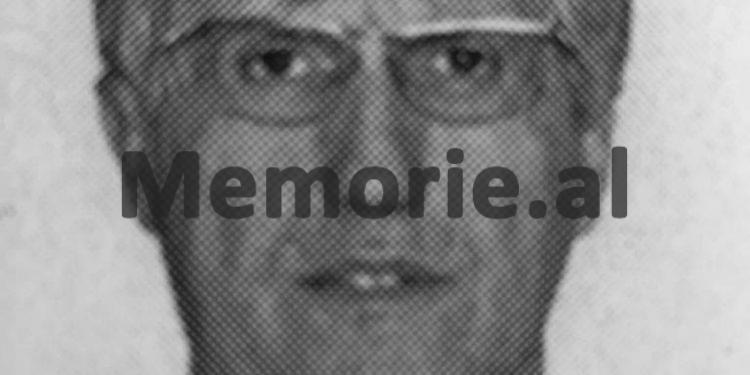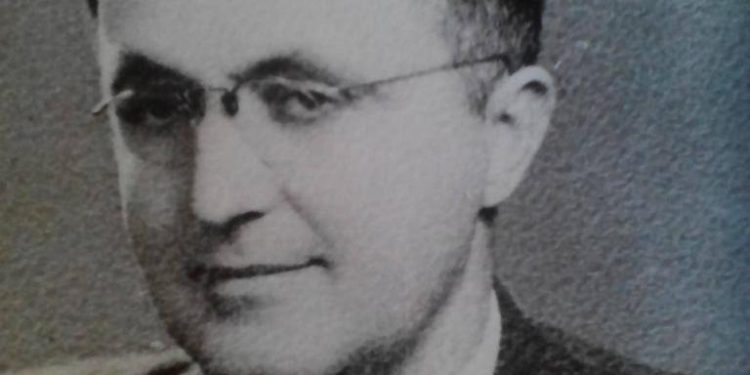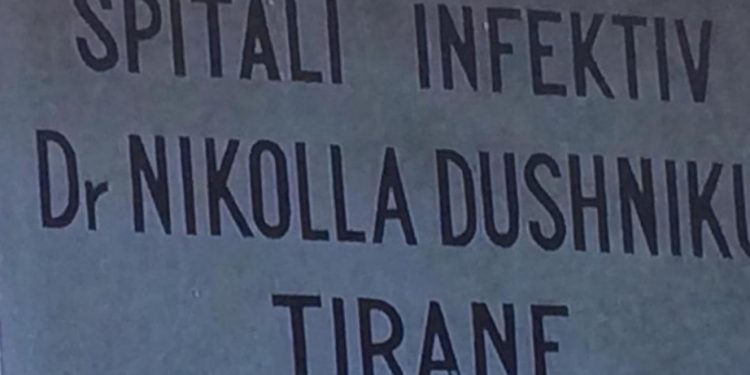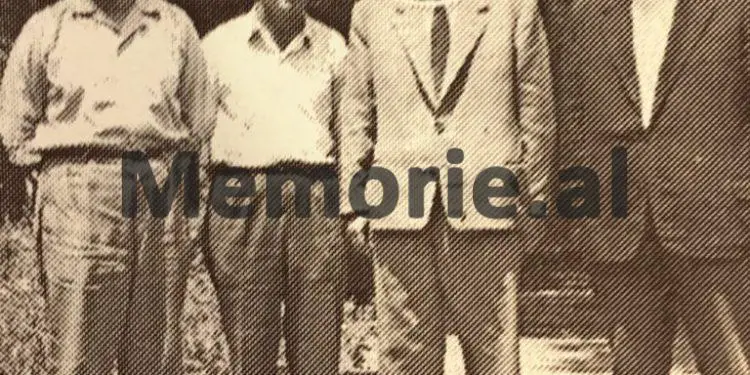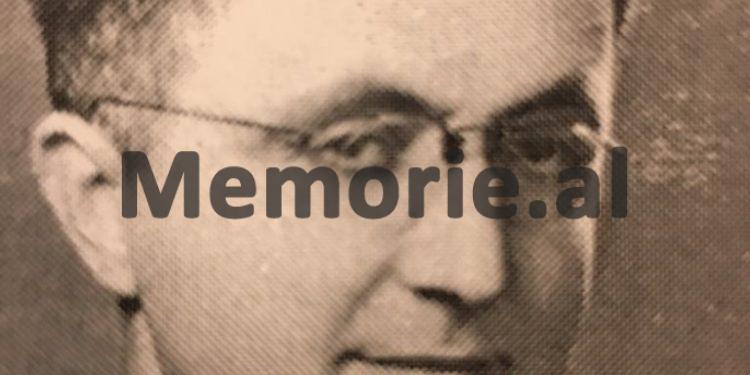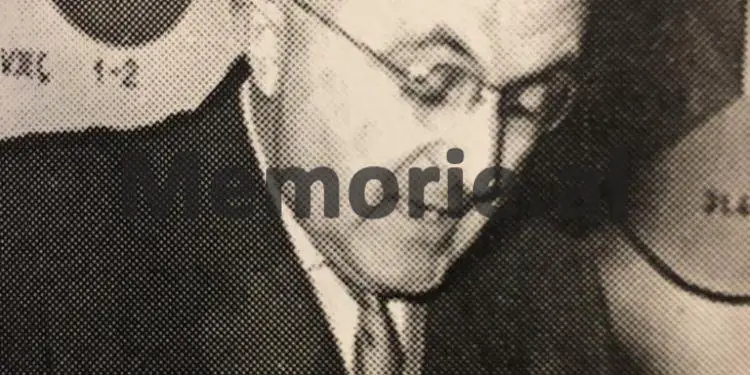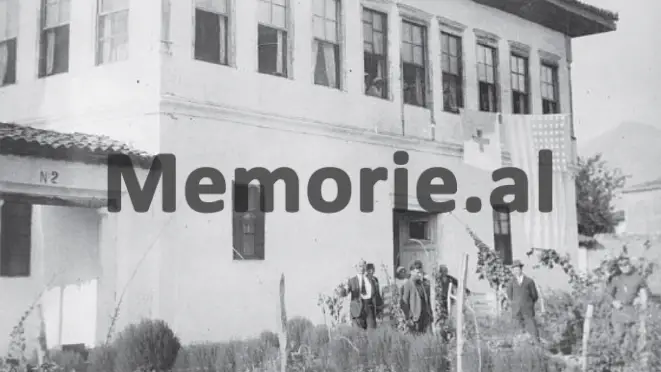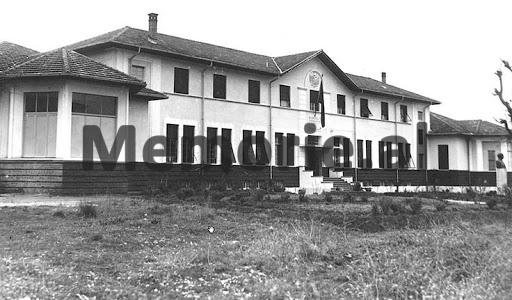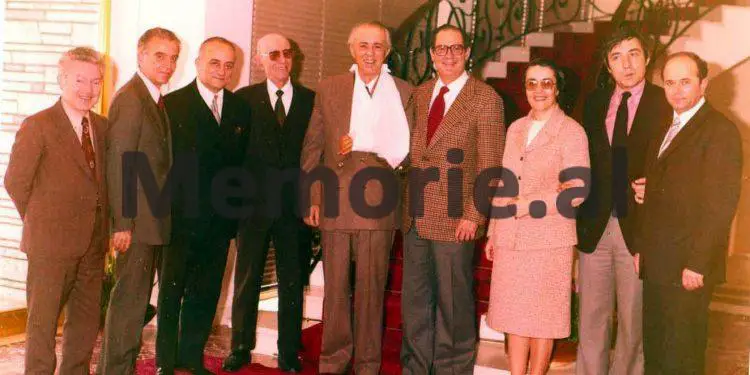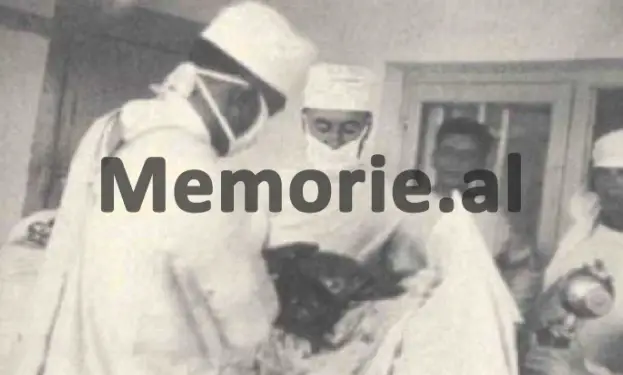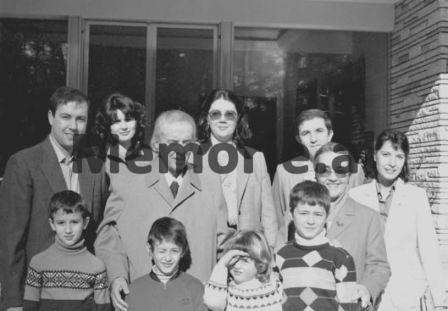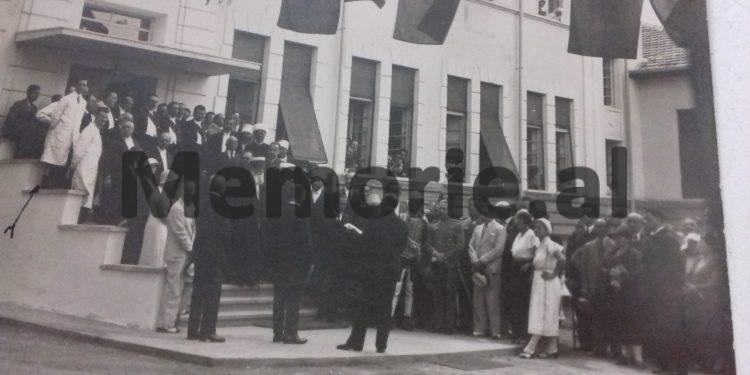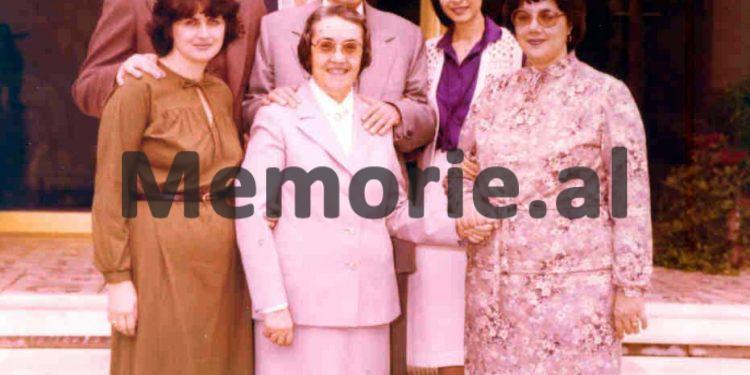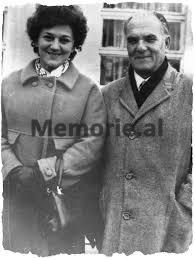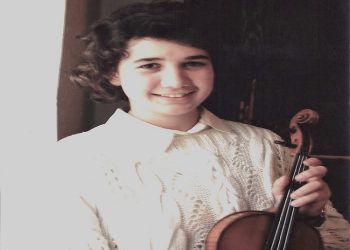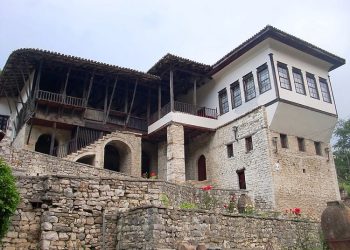Dashnor Kaloçi
Memorie.al publishes the unknown history of Prof. Dr. Nikola Dushnik, a well-known infectious physician originally from Berat who after studying at an Italian college on the island of Corfu in the late 1920s, pursued his studies at the Faculty of Medicine at the University of Athens, where he graduated with high scores in 1940 Return of Dr. Dushnik in Albania and his engagement with the Anti-Fascist Movement in the partisan ranks in the Skrapar district, where he was assigned a doctor after the war, to be subsequently transferred as director of the hospital in the city of Fier and near the Red Cross. Tirana, where he served until 1949 when he was appointed head of the Department of Epidemiology at the Ministry of Health.
Appointment of Dr. Dushnik in 1957 as Head of the Department of Infectious Diseases and Epidemiology at the Faculty of Tirana, where he served for many years with extraordinary dedication and his great contribution both in preparing new students of that faculty, as well as its impact on the building of the Hospital for Infectious Diseases, which bears its name after the 1990s.
Testimony of his son Mikel for the professional career of Dr. Dushnik, who, although not considered one of the trusted leadership physicians of that time, (due to his brother in Italy), he was often summoned to the Leadership Clinic to visit and diagnose senior leadership personalities of that time. time, like Manush Mufti, Spiro Koleka, to the family of Enver Hoxha, where he visited and treated his daughter, Spring from an infectious disease. The secret conversations of Dr. Dishnik with his colleagues, the famous doctors: Kristidhi, Zyma, Kërçiku, and Cani, when he found out about Enver’s eye disease and their joy and hope that he could withdraw from the political scene and run the country because of that illness. heavy.
“My father, Dr. Prof. Nikola Dushniku, who graduated from the University of Athens School of Medicine in 1940, and considered one of the best infectious doctors in Albania at the time, in the late 1950s, began even called him to the Leadership Clinic. Although he was not and was not one of the party’s trusted doctors, he was still called upon to visit and diagnose some of the senior personalities of the Communist nomenclature, beginning with members of the Political Bureau and their family members. I remember very well that there from 1964, my father took great care of Manush Mufti and Spiro Koleka, intensively following their health. Since his father had made a big name as an infusionist, around 1970, he was called to Enver Hoxha’s home to visit and cure his daughter, Spring, who had been affected by an infectious disease. . But even though he did all those services to the senior leadership, he not only had no sympathy for Enver Hoxha’s communist regime, but on the contrary, in his conscience, he was a staunch opponent of that system and all that he did, related to his profession as a humanitarian doctor. ” The first person to speak and testify about Memorie.al is 73-year-old Mikel Dushniku (a graduate of Industrial Chemistry), who tells us about his father’s unknown history, Prof. Dr. Nikola Dushnik, one of Albania’s most famous infectious doctors, whose name after the 90s, is called the Tirana Infectious Disease Hospital.
Who was Dr. Dushniku?
The famous infectious physician, Prof. Dr. Nikola Dushniku was born on December 6, 1912 in the city of Berat, where his father’s family, Thanas Dushniku, resided. After finishing elementary school in his hometown, Nicholas was sent to continue high school on the island of Corfu, where he enrolled in one of the colleges that the Italians had opened for years. At that college, Nicholas regularly attended classes from 1926 to 1931, and as soon as he graduated, he returned to Albania, completing his graduate studies at the Classical Gymnasium of the city of Shkodra. After staying with his family in the city of Berat for about three years in September 1934, he received a scholarship to pursue higher studies at the Faculty of Medicine at the University of Athens, which he completed with high results in 1940. th. After graduation, he returned to his hometown of Berat and, given that the period of his arrival in Albania coincided with the fascist occupation of the country, he became closely associated with the Anti-Fascist Movement, treating some youths at his home. communist members of the guerrilla units of that city. He continued until 1943 and at that time he was forced to go up the mountain to join the partisan forces operating in the Skrapar area after falling under the eyes of the Italian authorities who attempted to arrest him. By the end of the war, Dr. Dusnik stayed in the partisan ranks, serving as their physician, and early 1945, he was assigned to work in the deep Skrapar area where he had been with the partisan formations. In those two years that Dr. Dushnik served as a doctor in the deep area of Skrapar, he worked with great devotion by trampling all the villages to the furthest ones on the border with the Korça district, Berat and Permet. At that time, the name of the inhabitants of those villages was mentioned and told as in legends because of the passionate and diligent work he did, reaching out to the sick wherever and whenever they sought him. In 1947, he was transferred from Skrapar, appointing him as director of the Fier District State Hospital, and after a year he was brought to the Red Cross in Tirana. In addition to his work at that charity, Nikola Dushniku also worked in Tirana hospitals and in 1949 he was appointed head of the Epidemiology Branch of the Ministry of Health, activating and practicing his profession as a specialist in Anti-Tuberculosis Dispensary. of Tirana. In those years he did a great job of preventing the contagious diseases that were then widespread throughout the country. From 1952, Nikola Dushniku, along with his wife, Olimbi Shyti (daughter of a merchant from the city of Vlora), with whom he had been married since 1948, and three sons, (Edmond, Mikel, and Vango), settled in a house near the New Bazaar in Tirana.
Head of Epidemiology at the University of Tirana
In September 1957, Nicholas was appointed Head of the Department of Infectious Diseases and Epidemiology at the Faculty of Medicine at Tirana State University. During that time he devoted much attention to scientific research and in April 1961, he defended his dissertation entitled “Characteristics of the Measles Epidemic in Albania during 1954-1958”, with which he obtained the Scientific Degree, Candidate of Medical Sciences. Four years later, in March 1965, he was awarded the title “Professor.” Duty of Head of Department of Infectious Diseases. Prof. Dr. Nikola Dushniku exercised it until 1973. Regarding this period of time, his son Mikel states: “Being at the same time head of the infectious ward at the Tirana Civil Hospital, my father, Nikolla, argued the need to raise a separate building that had to respond to the needs of the time and the challenges of the future, dealing with the curium of infectious disease patients. His professionalism and perseverance, as well as that of other infectious colleagues in Tirana and around the country, who supported him without any reservation, made it possible to build the Infectious Hospital, which, under the conditions and circumstances of that time, was considered quite viable. good. Also after the approval of the decision to build that hospital, from the beginning of the works to the completion of it, my father worked from the first steps of the project with the relevant specialists, giving them suggestions related to the litigation. of the project for it to be as functional and as large as possible. From 1973 to 1977, when my father worked as a professor at the Faculty of Medicine in Tirana, he tried his best to: especially in the preparation of new medical staff. Although he was a lecturer at that faculty, he was constantly at the Civil Hospital for Infectious Diseases, staying for long hours at the bedside, with visits and consultations for patients coming from all over Albania. He also devoted special attention to the development of textbooks and to the enrichment of the medical literature of our country. Infectious Diseases Hospital in Tirana, but also taking an active part in successfully fighting infectious diseases in our country.
He cures the daughter of Enver Hoxha
Although the renowned physician, Prof. Dr. Dushnik had made a big name, being considered the best infections in Albania, the communist regime of that time, did not call him a trusted man and never took him overseas for any specialization in his field, as was the case. with other doctors his colleagues of various specialties. Concerning this, his son, Mikel, states: “Although in the late 1950s, our father began calling him to the Leadership Clinic to visit and diagnose some of the senior personalities of the communist nomenclature of that time, again he was not considered their trustee. This was because my father had a brother who had graduated from Italy during the war and had been left unable to return to Albania. The “weight of guilt” that came from him, as he was sometimes regarded as a fugitive, crushed my whole life. Likewise, his entire social circle, including physicians who were Western graduates such as Kristidhi, Dr. Zyma, Dr. Kërçiku, Dr. Petro Cani, and others, were not well looked after by the regime at the time, but my father was taken to the Leadership Clinic for the sole fact that he needed it. I remember very well that there from 1964, my father took great care of Manush Mufti and Spiro Koleka, intensively following their health. Since his father had made a big name as an infusionist, around 1970, he was called to Enver Hoxha’s home to visit and cure his daughter, Spring, who had been affected by an infectious disease. . But even though his father did all those services to senior leadership, he not only had no sympathy for Enver Hoxha’s communist regime but on the contrary, in his conscience, he was a staunch opponent of that system and all that he did, related to his profession as a humanitarian doctor. His father was against class warfare, and he did so by bringing in some of our former prisoners and political prisoners to our house, such as Gjergji Gjeto (originally from Korça) who taught English to all three of us. brothers. I remember very well in the early ’70s, when Enver visited Dr. Kristidhi and he had documented the damage to the eyes that were without salvation, the father with a circle of close friends, rejoiced and long-discussed among them. This was not because they wanted to see Enver Hoxha dead, but that they hoped he would withdraw from political life and pave the way for changes in the political course that senior communist leadership was pursuing. remembers his son, Mikel, about his father, who although he treated the senior personalities of the communist leader at the time, was viewed with suspicion by them. From the early 1970s, Dr. Dusnik was seriously ill and, with Hysni Kapo’s intervention, he was sent to a special clinic in Austria for treatment, which led him to live for several more years until his death on April 3, 1977. The Communist regime of that time did not hold any official ceremonies, and none of the high-profile personalities he had served for years had attended his burial, with the exception of Vito Kapo, who went on to show gratitude for what had done Dr. Dushnik for her family. The Name and work of Dr. Dushnik was praised only after the 1990s, where, among other things, the Infectious Diseases Hospital in Tirana bears his name.
Thanas Dushniku, the wise old man who did not tell the Codex of Berat
Family of renowned infections doctor, Dr. Prof. Nikolla Dushniku, originally from the village of Berat, from which they inherited the surname and their ancestors had lived there for centuries. From the last years of the eighteenth century, the Dushniks moved and settled in the Kala neighborhood of the city of Berat. At that time, in the neighborhood that was located within the stone walls of the castle, many well-known Berat families lived, such as Doga, Haxhistasa, etc., known as the aristocracy of the Berat Prefecture. Nicholas’ father, Thanasai, who was known as one of the cultured men of that city, had graduated from high school at Ioannina’s Zosimea Gymnasium. Thanasi was known throughout the city as one of the elders of the Kala neighborhood, who did not indicate where the Ancient Codex of Berat was hiding. He knew very well where the old books that were regarded as the most precious treasures were hiding, but did not reveal their place, preserving and applying that old “code” as very old to him, who had gone in the next world without saying a word about where they were. At an early age, Thanasi was involved in the trade of goods from Italy, Turkey and Austria, and with the profits he made, he opened several stores in the cities of Berat, Roskovec, and Fier. Thanasius, the wise and strong old man who lived long past the ’90s, in his youth married a young girl named Aspasi, who was from the village of Paftal in Berat and from this by marriage, they were born six children, where Nicholas was the eldest. Memorie.al




